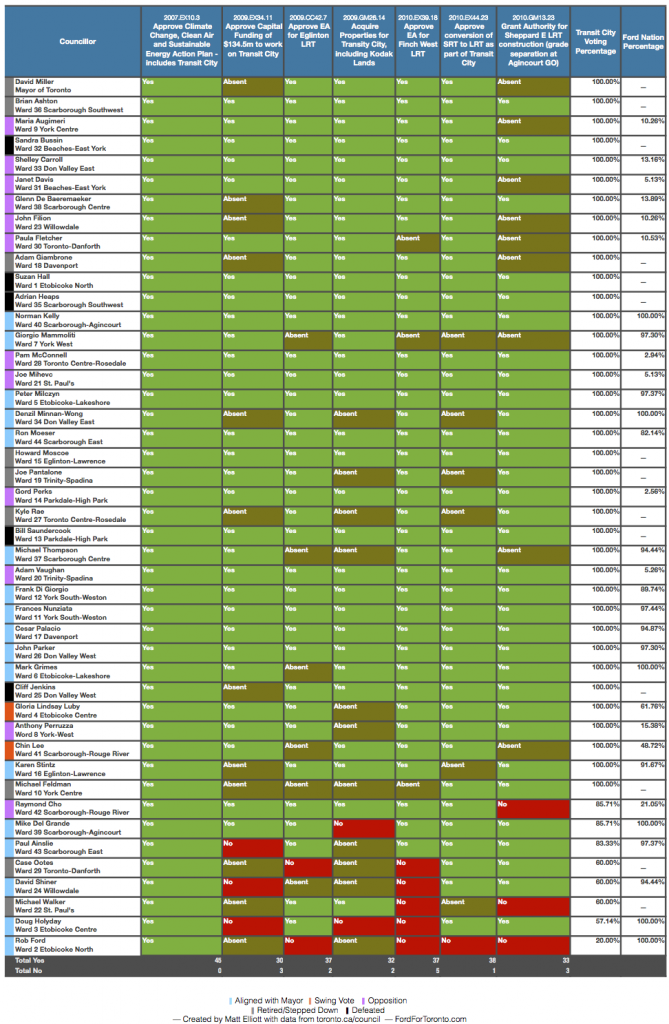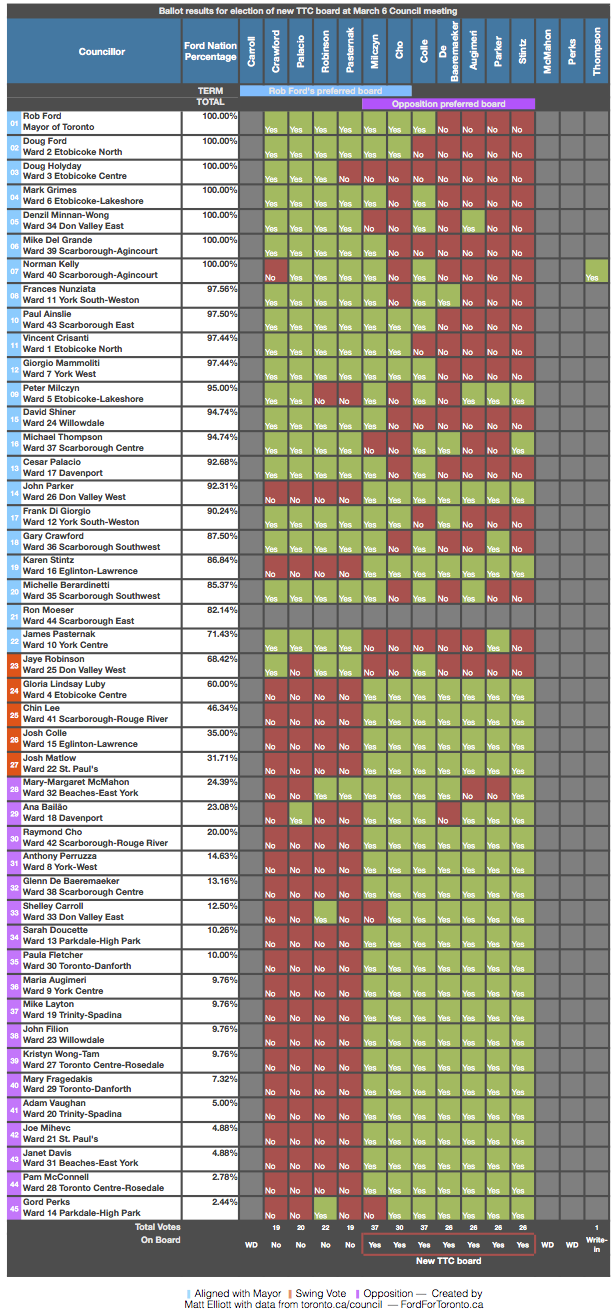
A retro City Council Scorecard: occasions where the 2006-2010 council voted on Transit City. Click for bigger.
On Twitter Sunday night, Councillor Denzil Minnan-Wong charmingly asked if it’s “a good time to mention that Transit City was never brought before Council for approval?”
He posed his smug question, I guess, because of this news story, as reported by the Toronto Star’s Tess Kalinowski:
A report by a respected Toronto law firm says Mayor Rob Ford exceeded his legal authority when he cancelled Transit City without city council approval.
Councillor Joe Mihevc, who solicited the legal opinion, will release it publicly on Monday.
It says the mayor had no business entering into a non-binding memorandum of understanding with the province that authorized a new transit plan, including a Sheppard subway and a longer tunnel on the Eglinton light rail line. It says he further overstepped his powers when he told TTC chief general manager Gary Webster to stop work on Transit City.
via Mayor Rob Ford had no authority to cancel Transit City, lawyers say | Toronto Star.
The sad thing is that a legal opinion really wasn’t needed. Anyone with the ability to read sentences would come to the same conclusion that the lawyers did. The Memorandum of Understanding that set the new direction for transit in Toronto, as signed by the mayor and Metrolinx last March, was explicitly a non-binding agreement designed to “provide a framework for the negotiation of agreements to be approved by [the mayor and Metrolinx’s] governing bodies.” In the mayor’s case, that governing body is council.
Further, the City Manager wrote, in a response to an Administrative Inquiry by Councillor Janet Davis, that “any agreements to implement the Memorandum will require Council approval.”
So Ford clearly violated the limits of his power when he went and started implementing his transit plans. And don’t forget: his decision to kill Transit City cost the city more than $200 million in cancellation fees and wasted work by staff and consultants.
That $200 million stands as a bigger example of government waste than anything Ford has identified as ‘gravy’ at City Hall thus far. It’s a figure that exceeds the entire budget of the St. Clair streetcar right-of-way project.
But council was at least somewhat complicit in letting him get away with it. On his radio show yesterday, Councillor Josh Matlow asked Mihevc why he only commissioned this legal opinion now and not, say, a year ago — when most everybody knew Ford had overstepped his bounds. Mihevc was polite in his answer, but his real reasoning seems obvious: it didn’t make sense to make any noise about the mayor’s transit plan at the time because, had a vote on the subject actually come to council, guys like Matlow — and the other middle-aligned councillors — might have supported the mayor.
Things are different now.
But back to Minnan-Wong. He’s not just wrong in his claim that council never voted on Transit City. He is wrong in at least seven different ways.
How council endorsed Transit City at least seven times
I guess the implication when Minnan-Wong and others claim Transit City was never put to a vote is that never did David Miller bring an item to council asking for endorsement on the “Transit City” brand. And it’s true: council never approved the bundling of a number of suburban light rail projects together under that name, nor did they specifically endorse, in advance, Miller and Adam Giambrone’s decision to work with the province to get Transit City included as part of Dalton McGuinty’s MoveOntario 2020 funding announcement.
But council did approve — often overwhelmingly — every element of the Transit City plan that moved beyond early planning stages. Beginning in 2007, they unanimously approved the direction of Transit City as part of a Climate Change action plan. In 2009, as projects really started moving, Council approved capital expenditures of more than $134 million to work on Transit City. That same year, they approved  Environment Assessments for the Sheppard East LRT (no recorded vote), the Eglinton LRT — which at that point was running on the surface at both ends — and the Finch West LRT. They also okayed the acquisition of land from private owners to support various parts of Transit City. In 2010, council opted to make the Scarborough RT rebuild part of Transit City, converting it from a proprietary technology to the same light rail planned for Eglinton, Finch and Sheppard East. (Council also endorsed Transit City as part of a debate on an extension of the Yonge subway into Richmond Hill.)
Lastly, council gave authority to actually begin work on the light rail project on Sheppard East. Only three councillors opposed, including the mayor. This grade separation work was underway at Agincourt when Rob Ford cancelled the project.
No one denies that Ford has the ability to set priorities and direction on the transit file. He’s the mayor. But he is not allowed to move forward with decisions that impact the finances of this city without council’s endorsement.
Council had numerous opportunities to alter or stop forward movement on Transit City. They’ve have had no such opportunity with Rob Ford’s so-called “Transportation City.” It’s moved forward like a runaway train.

